
A climbing competition is usually held indoors on purpose built climbing walls. There are three main types of climbing competition: lead, speed, and bouldering. In lead climbing, the competitors start at the bottom of a route and must climb it within a certain time frame in a single attempt, making sure to clip the rope into pre-placed quickdraws along the route. Bouldering competitions consist of climbing short problems without rope, with the emphasis on number of problems completed and the attempts necessary to do so. Speed climbing can either be an individual or team event, with the person or team that can climb a standardized route the fastest winning.
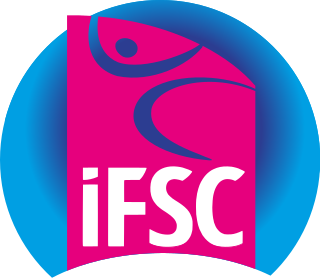
The International Federation of Sport Climbing (IFSC) is the international governing body for the sport of competitive climbing, which consists of the disciplines lead climbing, speed climbing, and bouldering. It was founded in Frankfurt on 27 January 2007 by 48 member federations, and is a continuation of the International Council for Competition Climbing, which had been in existence from 1997 to 2007 and was a part of the Union Internationale des Associations d'Alpinisme (UIAA).
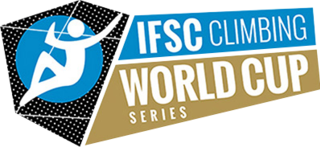
The IFSC Climbing World Cup is a series of climbing competitions held annually and organized by the International Federation of Sport Climbing (IFSC). The athletes compete in three disciplines: lead, bouldering and speed. The number of competitions and venues vary from year to year. The first World Cup was held in 1989, and included only lead climbing events. Speed climbing was introduced in 1998 and bouldering in 1999. For 18 seasons, from 1989 to 2006, World Cups were held under the auspices of UIAA and called UIAA Climbing World Cups. Since 2007, they have been held under the auspices of the IFSC.
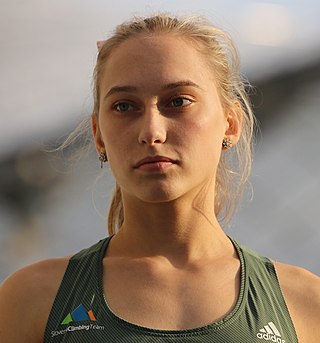
Janja Garnbret is a Slovenian rock climber and sport climber who has won multiple lead climbing and bouldering events at climbing competitions. In 2021, she became the first ever female Olympic gold medalist in sport climbing, and is widely regarded as one of the greatest competitive climbers of all time. She is also the world's first-ever female climber to onsight an 8c (5.14b) graded sport climbing route. As of the end of 2022, Garnbret had won the most IFSC gold medals of any competitive climber in history.
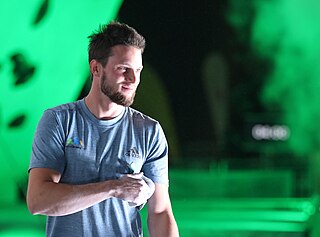
The 2018 season of the IFSC Climbing World Cup was the 20th season of the competition. Bouldering competitions were held at seven stops of the IFSC Climbing World Cup. The bouldering season began on April 13 at the World Cup in Meiringen, and concluded on 18 August with the World Cup in Munich. At each stop a qualifying was held on the first day of the competition, and the semi-final and final rounds are conducted on the second day of the competition. The winners were awarded trophies, and the best three finishers received medals. At the end of the season an overall ranking was determined based upon points, which athletes were awarded for finishing in the top 30 of each individual event. Jernej Kruder won the seasonal title in the men's competition and Miho Nonaka won the women's. Japan won the national team competition.

The 2017 season of the IFSC Climbing World Cup was the 19th season of the competition. Bouldering competitions were being held at seven stops of the IFSC Climbing World Cup. The bouldering season began on April 7 at the World Cup in Meiringen, and concluded on 19 August at the World Cup in Munich. At each stop a qualifying was held on the first day, and the semi-final and final rounds were conducted on the second day of the competition. The winners were awarded trophies, and the best three finishers received medals. At the end of the season an overall ranking was determined based upon points, which athletes were awarded for finishing in the top 30 of each individual event. Shauna Coxsey won the women's World Cup and Jongwon Chon won the men's World Cup.
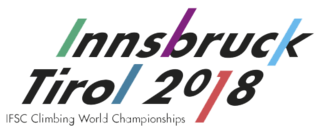
The 2018 IFSC Climbing World Championships, the 15th edition, were held in Innsbruck, Austria from 6 to 16 September 2018. The championships consisted of lead, speed, bouldering, paraclimbing, and combined events.
The 2017 IFSC Climbing World Cup was held in 15 locations. Bouldering competitions were held in 7 locations, lead in 8 locations, and speed in 7 locations. The season began on 7 April in Meiringen, Switzerland and concluded on 12 November in Kranj, Slovenia.
The 2018 IFSC Climbing World Cup was held in 14 locations. There were 22 events: 7 bouldering, 7 lead, and 8 speed events. The season began on 13 April in Meiringen, Switzerland, and concluded on 28 October in Xiamen, China.
The 2016 IFSC Climbing World Cup was held in 16 locations. Bouldering, lead and speed competitions were held in 7 locations. The season began on 15 April in Meiringen, Switzerland and concluded on 27 November in Kranj, Slovenia.
The 2015 IFSC Climbing World Cup was held in 13 locations. Bouldering competitions were held in 5 locations, lead in 7 locations, and speed in 5 locations. The season began on 17 May in Central Saanich, Canada and concluded on 15 November in Kranj, Slovenia.
The 2019 season of the IFSC Climbing World Cup was the 21st season of the competition. Bouldering competitions were held at six stops of the IFSC Climbing World Cup. The bouldering season began on April 5 at the World Cup in Meiringen, and concluded on June 8 with the World Cup in Vail. At each stop a qualifying was held on the first day of the competition, and the semi-final and final rounds were conducted on the second day of the competition. The winners were awarded trophies, and the best three finishers received medals. At the end of the season an overall ranking was determined based upon points, which athletes were awarded for finishing in the top 30 of each individual event.
The 2019 IFSC Climbing World Cup was held in 12 locations. Bouldering, lead and speed competitions were each held in 6 locations. The season began on 5 April in Meiringen, Switzerland with the first bouldering competition in the season, and concluded on 27 October in Inzai, Japan, with the last lead climbing competition in the season.

Ai Mori is a Japanese professional rock climber, sport climber and boulderer. At the 2019 IFSC Climbing World Championships, she became the youngest Japanese athlete to finish in podium place in the competition, finishing third in lead, has won Japan Cup titles in both bouldering and lead disciplines, and has multiple IFSC Climbing World Cup podium finishes, including three gold medal in World Cup events in 2022.

Natalia Grossman is an American professional rock climber. She represents the United States at IFSC Climbing World Cup in bouldering and lead,. She won a gold and a silver medal at the 2021 IFSC Climbing World Championships and has 14 podium finishes at Climbing World Cup events, including seven gold medals.
The 2021 IFSC Climbing World Cup was the 33rd edition of the international sport climbing competition series, held in seven locations. There are 11 events: four bouldering, five lead, and two speed events. The season began on 16 April in Meiringen, Switzerland with the first bouldering competition in the season, and concluded on 4 September in Kranj, Slovenia. The International Federation of Sport Climbing had initially scheduled 18 events concluding on 31 October, but COVID-19 travel restrictions resulted in the cancellation of events in Xiamen and Wujiang in China, Jakarta in Indonesia and Seoul in South Korea.
Lead climbing competitions at the 2019 IFSC Climbing World Cup were held at six locations, from 4 July to 27 October 2019. The top three in each competition received medals, and at the end of the season, the overall winners were awarded trophies. The overall winners were determined based upon points, which athletes were awarded for finishing in the top 30 of each individual event. Adam Ondra won the men's seasonal title, Chaehyun Seo won the women's seasonal title, and Japan won the national team title.
Lead climbing competitions at the 2021 IFSC Climbing World Cup were held at five locations, from 23 June to 4 September 2021. The International Federation of Sport Climbing had initially scheduled six lead climbing events concluding on 17 October, but COVID-19 travel restrictions resulted in the cancellation of event in Xiamen, China.

Yoshiyuki Ogata is a Japanese professional sport climber and boulderer. He has won multiple medals in bouldering at IFSC Climbing World Cup events, including gold medals at Vail in 2019 and at Innsbruck in 2021. Ogata won the overall IFSC Men's Bouldering title for the 2021 and 2022 seasons and finished third overall in 2019.
The 2022 IFSC Climbing World Cup is the 34th edition of the international sport climbing competition series organised by the International Federation of Sport Climbing (IFSC), held in 12 locations. There are 21 events: six bouldering, seven lead, seven speed, and one bouldering & lead combined events. The series began on 8 April in Meiringen, Switzerland with the first bouldering competitions of the season, and concludes on 22 October in Morioka-Iwate, Japan, which introduces the Boulder & Lead combined format that will be used at the 2024 Summer Olympics in Paris.










